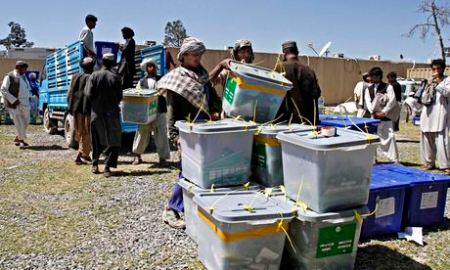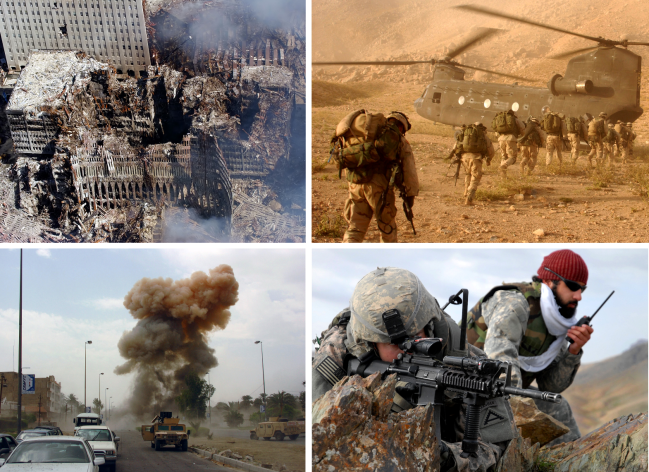By John Haltiwanger
Afghanistan, a nation marred by violence and poverty, has been given little cause for optimism in recent times. This past weekend, however, hope returned to the hearts of the Afghan people as they came forth to cast their votes in the presidential election. The election marks the first-ever democratic transfer of power for Afghanistan, making it an exceptionally historic event for a nation often defined by turmoil.
Despite concerns of fraud, threats of violence from the Taliban, and general intimidation, a record number came out on April 5th for the vote. According to the BBC, 7 million out of an estimated eligible 12 million voted in the election for the new president, making it an enormous and largely peaceful success for Afghanistan. Accordingly, the election also displays the immense courage, integrity, and determination of the Afghan people.
The Taliban threatened to thwart the vote, pledging to attack the election and anyone involved with it, but it is apparent that they failed in this endeavor. Unfortunately, however, there were still reports of violence in the country on Saturday. According to the Kevin Sieff, “At least 23 people were killed on election day and the prior day, mostly soldiers and police officers, the government announced.” Additionally, eighty-nine Taliban militants were also killed, and 179 other fighters arrested.
Yet, there were no large-scale attacks in Kabul, and the day was decidedly more peaceful than many predicted.
In an exclusive interview, Sam Schneider, the English news editor for the Kabul based TOLOnews, stated:
The campaign season went pretty well, though a lot if it was theater rather than substantive. But in a country where just over 40% of people are literate, that’s not all that surprising. The main themes of the lead-up were definitely Taliban violence, government interference and voter fraud. There was a slue of attacks in the two weeks before the vote, with attacks on election officials, security personnel and journalists nearly everyday. Most expats were evacuated by their companies over election weekend, pretty much only journalists remained. Democracy International even pulled out the observers it was going to use. All of this contributed to an overwhelming gloomy outlook peddled in western media. But when Election Day came and went with less violence than most average days see, the build-up fell flat on its face and gave way to a ubiquitous sense of accomplishment and pride across the country.
In 2009, during the last presidential elections, the story was much different as there were widespread allegations that the election was rigged in favor of the incumbent, President Karzai. Now, however, Karzai must step down as the constitution limits him to two terms. Thus, this election is arguably more egalitarian and democratic.
Furthermore, as Helena Malikyar notes for Al Jazeera, “It will take a few days to know approximate numbers of voters and vote distributions and two weeks before Afghanistan’s Independent Election Commission announces the final figures. But, many observers estimate that around 7 million eligible voters cast their ballots on April 5. That will make a turnout of close to 60 percent, while in 2009 about 4.5 million had voted.” Hence, it is apparent that this election was a vast improvement from Afghanistan’s previous presidential election, and a huge step forward for the country.
However, there were still widespread concerns of fraud leading up this election, largely as a consequence of the nature of the election in 2009. As Emma Graham-Harrison notes for The Guardian, “After more than a decade under President Hamid Karzai, there have been widespread fears that the election would be sewn up in favour of a chosen successor, or that people disillusioned with corruption and mismanagement would stay away. In 2009 the vote that returned Karzai to power was marred by widespread fraud, with more than a million ballots thrown out.”
While these fears and concerns were well founded, it appears that the anti-fraud measures put in place for this election were largely successful. As Sam Schneider puts it:
Regarding the allegations of fraud, there was undoubtedly some ballot box stuffing and attempts by voters to use fraudulent voting cards or recycle ones that had already been used, but early reports from Afghan and non-Afghan observers have suggested that it was significantly less of an issue than it was in 2009… In the 2009 vote, Karzai still had sway over most local officials, which the constitution allows the president to directly appoint, which gave him an advantage in leveraging interference in his favor… The big question regarding fraud now is whether or not the ballot shortages that were seen all over the country surprising early in the day were related to ballot box stuffing or simply the fact that more people showed up to vote than expected… By the end of the day, there were thousands of people in provinces like Herat, Kabul and Balkh (which saw the highest turnout) that did not get to vote despite waiting in line because there were not ballots left for them.
It will take at least 6 weeks for the results to come in and a final result to be declared. Hence, as Schneider notes, “What matters most moving forward is how the vote counting process goes, and whether or not people see the result as being legitimate… The next few weeks and months are going to be just as important, and vulnerable, as the last few were.”
Afghanistan is nation with deep ethnic divisions, which will play a large role in the outcome of the election. It is notable that the two campaigns consistently leading in the pre-election polling have crossed ethnic lines to form their tickets. There are eight candidates in total, and in order to win one will have to score over 50 percent of the vote in order to avoid a run-off with his nearest rival. Some are concerned that this could lead to violence in a country that desperately needs strong and stable leadership. As Al Jazeera notes, “There are a number of efforts underway to prevent such crisis by bringing most, if not all, of the top candidates together under a form of a coalition government.”
The top three contenders are Ashraf Ghani, Zalmai Rassoul, and Abdullah Abdullah. Ghani was the finance minister under Karzai, while Abdullah was Karzai’s foreign minister. Abdullah also ran in 2009, but dropped out in protest over widespread voter fraud.
While Karzai has not formally endorsed Rassoul, it is widely argued that he is the establishment candidate. Accordingly, Schneider notes:
I think a major sign of whether or not the vote was compromised, and meddled with by the Karzai administration, for example, will be how well Zalmai Rassoul does. Most experts recognize that he is not nearly as popular nationwide as Abdullah and Ashraf Ghani, and surveys leading up to the vote support that view, but he was endorsed by Karzai’s brother, Qayoum, and is generally regarded as being the favored candidate of the palace. If he somehow manages to place second, or first, that would seem pretty fishy.
If there is no winner, a run-off election will occur on May 28 between the two front-runners.
One of the biggest concerns with this is that a delay could impact the completion of a pact between the US and Afghanistan that would keep up to 10,000 US troops in the country beyond 2014. In February, President Obama announced a complete withdrawal of US forces from Afghanistan by the end of the year, while simultaneously stating his preference for keeping residual forces in the country in order to prevent terrorists from gaining a foothold there. Karzai refused to agree to this and his relationship with President Obama and the US has become quite strained recently, but the top three candidates have all pledged to sign it.
President Obama has congratulated Afghanistan for its election and has pledged to work closely with Karzai’s successor – whoever that may be. The US military has been present in Afghanistan since 2001, in what has been the longest conflict in US history – the War in Afghanistan. Furthermore, Afghanistan has been a constant point of frustration for the Obama administration. Thus, it is not surprising that Obama and the US government are watching this election and its outcome closely.
The future of Afghanistan is still up in the air, but the world can congratulate it for holding a successful and peaceful election after 13 tumultuous years in which at least 16,000 Afghans have died. Hopefully this positive trend will continue, and it is reassuring that the Afghan people seem determined to come together and regain control of the fate of their country.
About the author: John Haltiwanger is the Editor-in-Chief of One World, Many Voices – A Global Conversation. John is 25-years-old and grew up in the Washington DC area. He earned a BA in History from St. Mary’s College of Maryland. In Dec. 2013, John completed an MSc in International Relations at the University of Glasgow. At present, John works as a Communications and Project Support Officer for the Scottish Global Forum, an independent research institute. John aims to research and write in the areas of international politics, human rights, social justice, defense and security, conflict resolution, and war and media studies. He enjoys traveling, writing, football (soccer), music, and film.



